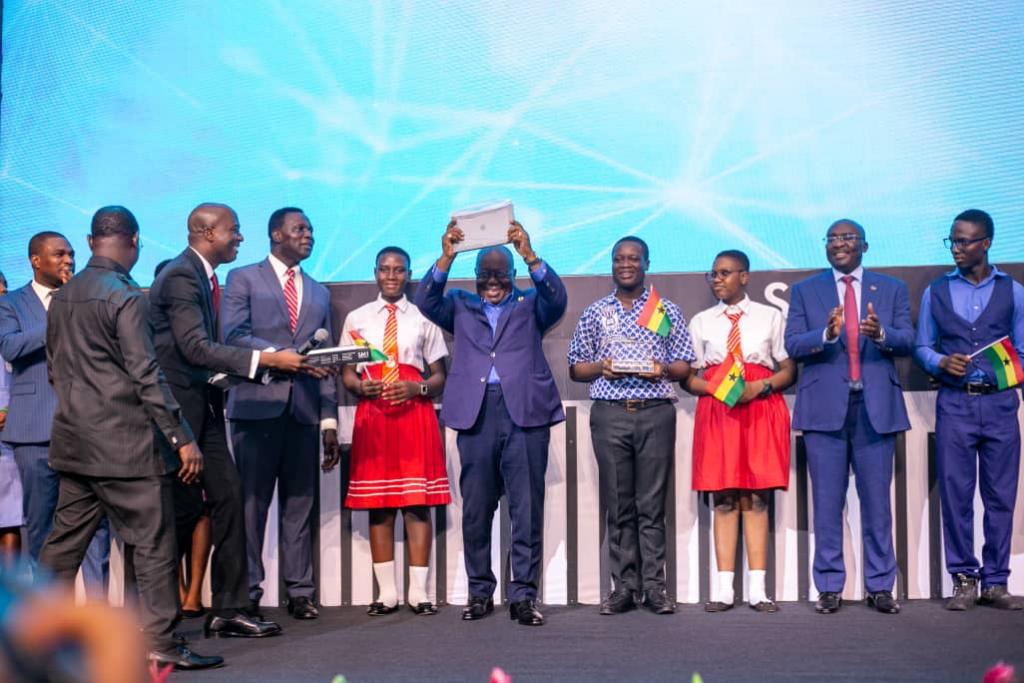The Ghanaian government has begun a programme to provide 1.3 million free tablets to pupils in the country’s secondary schools in an effort to boost students’ proficiency with digital tools.
At Monday’s launch of the Ghana Smart Schools Project, President Nana Addo Dankwa Akufo-Addo stated that the government is trying to digitise every aspect of the country. The project’s initial phase involves distributing free tablets to 15 schools; eventually, it aspires to reach every senior high school nationwide.
According to him, the government is certain that digitisation will drive the free senior high school program’s next phase because it will facilitate an eco-friendly learning environment and allow for a seamless online and offline teaching and learning experience.
In addition, Akufo-Addo stated that by the end of the year, the government will have built 30 smart schools around the nation. As part of the smart learning initiative, the president announced that the government will also be providing discounted laptops and tablets to college students and faculty to help with schoolwork.
Read also: TCRA, Tanzania regulator promotes digital skills among students
“Education is at the centre of poverty eradication, and as we gather here today, let us reflect on the crucial role education plays in shaping the future of our nation,” he said.
More Components of the Ghana Smart School Project
Touching on the other components of the Ghana Smart Schools Project, which is the provision of 100 modernised infrastructure, he said the remaining 70 schools were expected to be completed in the next two years.
President Akufo-Addo said the plan was that the 100 Smart Schools would be located in the cities in all 16 regions.
These smart school buildings, he said, would be fitted with solar panels as the government seeks to promote new and environmentally sustainable energy, meaning that the schools would be off the national electricity grid.
The President said the schools would also have digitalised infrastructure to advance teaching and learning and that the physical infrastructure took cognisance of the country’s unique climatic conditions, and would create a conducive atmosphere for learning.
The schools will represent a new urban landmark for urban rural land use and planning. There will be modern iconic facilities, depicting the collective resolve of people for transformative and futuristic education.
President Akufo-Addo said the project was in fulfilment of the education for sustainable development agenda, a key element in the 2030 Agenda for Sustainable Development Goal number four, which prioritises quality education, a key driver for the attainment of all 17 SDGs.
It will provide the needed infrastructure to facilitate e-learning and digitalisation to boost high school education in the country.
And as a well thought out arrangement, a student will be provided with an electronic tablet on which are comprehensive teaching and learning management systems and digital learning contents to facilitate research, teaching and learning.
On Free SHS enrolment, President Akufo-Addo noted that from the initial annual enrolment of 422, 940, some 503,000 children entered SHS this year, the highest-ever enrolment of children into SHS in a single year in the country’s history. He added that 5.10 million children have benefited from the Free SHS Policy since it was instituted in September 2017.
He said this had consumed a considerable budgetary allocation of some GH¢ 12.8 billion, amply demonstrating the sheer determination of the Akufo-Addo government to ensure that education became a catalyst around which the future transformation of the nation would revolve.
The role of the ministry
The Minister of Education, Dr Yaw Osei Adutwum, said under the Free SHS programme, the government had produced some impressive outcomes and results from the West African Senior School Certificate Examination (WASSCE).
Read also: Zambia’s MTN skills academy addresses digital skills gap
Currently, he said, Ghanaian SHS graduates were studying in some of the prestigious universities in Ghana and other parts of the world, with some of them emerging tops at the WASSCE level, adding that “this is the legacy of the Akufo-Addo-led government”.
He said across the country, the government had enhanced the state of infrastructure on various campuses, and provided more textbooks, other teaching and learning materials and taken steps to enrich the curriculum as a new pathway to future high school education.
He noted that the government has provided computers to schools and provided free WiFi to propel their utilisation. They have also boosted the reward system with an enhanced Best Teacher Award scheme.
Dr Adutwum said time was ticking for Ghana and the rest of the world to achieve the target set in the Sustainable Development Goals, and for those in the education arena, they had only the next six years to ensure inclusive and equitable quality education and promote lifelong learning opportunities for all.
















